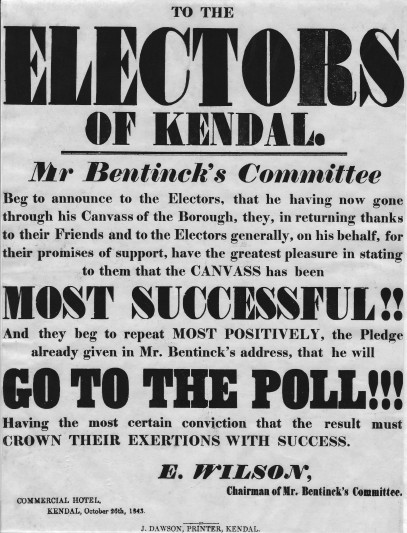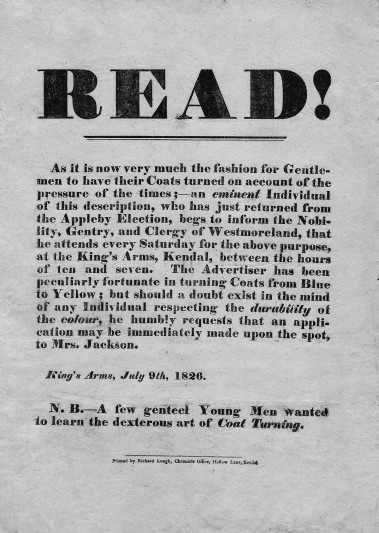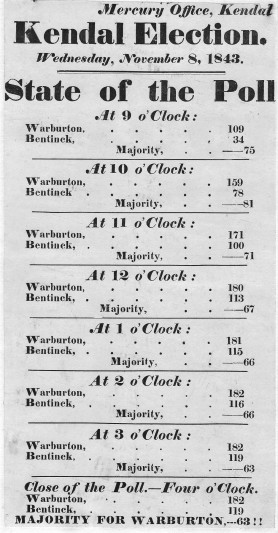In 2019 the Armitt Museum and Library was able, through the generosity of the Friends of the National Libraries, to purchase a fascinating collection of documents covering a century of Westmorland Parliamentary Elections. The archive consists of 175 items: broadsides, leaflets and pamphlets, covering the period from 1818-1910 with significant collections from the 1826 and 1843 elections. These were politically turbulent times with electoral, agricultural and political reform at the forefront of the public mind, issues that were fought out at the local level through the hustings. During this period Westmorland was dominated by a landed elite, led by the Lowther family, Earls of Lonsdale. Henry Brougham was the long-standing Liberal candidate for Westmorland, and was MP for several constituencies outside the area.
Broadsides, originally designed for public announcements, became vehicles for political agitation and what is now known as ‘popular culture’. They filled the place occupied today by the tabloid press and were by far the most popular ephemeral format used throughout printed history. As with today’s tabloids, the language is often inflammatory. In 1818 an anti-Brougham broadside addressed to the ‘Freeholders of the County of Westmorland’ the day after the ‘Kendal Riot’, complains that the Lowther faction was ‘assaulted by a mob inflamed by liquor paid for by themselves’. It goes on to describe the ‘Bloodhounds of Riot and Insurrection’ and wonders that anyone escaped alive as ‘the rabid fury of the populace seemed ripe for general bloodshed’. In response, a Pro Brougham broadside a few days later refers to the Lowthers as ‘dastardly sycophants who have been so long preying on the vitals of the Country, and are now everywhere quaking, screaming, and almost ready to disgorge themselves, through pure cowardice…’. Clearly an appetite for the salacious, or indeed politics reduced to the level of a theatrical event, is not an entirely modern phenomenon.
North Westmorland was characterised as ‘a feudal appendage of the House of Lowther’, the South as a deferential community which loyally supported the existing social order, described by the Westmorland Gazette in 1880 as ‘the old rest and be content spirit’ of conformism. However, the persistence of Nonconformity and small independent farmers, meant that there was always the potential for a realistic Liberal challenge, and the Lowther agents had to work diligently to sustain the status quo. Tory broadsides adopted the term ‘King and Constitution’ rather than the previous motto ‘Church and King’ apparently on the advice of William Wordsworth, as many of voters were dissenters.
The Armitt already held a number of items relating to early 19th century electioneering in the county including the annotated Poll Books for the Knights of the Shire of Westmorland from the turbulent 1818 and 1820 elections. These were presented to the Armitt by Beatrix Potter in 1938 and originally belonged to John Heelis, an ancestor of her husband and agent to the Whig party in Westmorland.
Although the collection might primarily be seen as an important research tool for the study of popular culture and political engagement on a local level during the 19th century, it also has great vitality and visual interest, in particular with the liberal use of Robert Thorne's Fat Face typography, the first real display typeface, introduced in 1803. Items from the collection will be on display at the Armitt Library in 2020.


